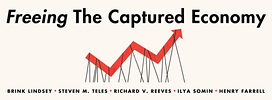Lead Essay
Brink Lindsey and Steven M. Teles have largely made their peace with “big government.” They insist, though, that not all big government is good, and they draw on libertarian insights to criticize government action that tends to concentrate wealth and power in the hands of a few. The political mainstream can learn much about doing even big government better, and ironically, some of that insight comes from those who have been most skeptical about big government itself - libertarians.
Response Essays
Ilya Somin argues that in our attempts to free the economy and deliver prosperity to more people, there is no substitute for limited government. Government has not only captured the economy; it holds people where they are by making it more difficult to live and work in new places. This reduces economy dynamism as well as limiting individuals’ choices. Human mobility is a key part of the puzzle, he argues.
Henry Farrell urges libertarians to give up on the idea of rent seeking. There is no such thing as an unregulated market, so “rent seeking” ends up meaning something like “state action I happen to disfavor.” This will not do, he says, and he urges decisive interventions, particularly in financial markets, to save the neoliberal state. This he characterizes as a mix of market institutions and democracy. Democracy is the part in peril, he argues, not markets.
liberal. Though it is out of fashion and more often found a term of abuse today, liberal politics works to ensure that citizens share power broadly, and that no one can wield arbitrary power over another. Reeves suggests that we need even more of this kind of liberalism.
The Conversation
Coming Up
Conversation through the end of the month.
Related at Cato
Cato White Paper: Low-Hanging Fruit Guarded by Dragons: Reforming Regressive Regulation to Boost U.S. Economic Growth, June 22, 2015.
Online Forum: Reviving Economic Growth, December 4, 2014
Cato Unbound: Libertarianism: Past and Prospects, March 2007
Cato Unbound: Should Libertarians Vote Democrat? October 2006

